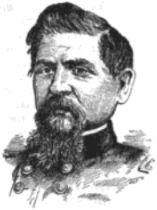Horatio G. Sickel facts for kids
Quick facts for kids
Horatio Gates Sickel
|
|
|---|---|
 |
|
| Born | April 3, 1817 Bucks County, Pennsylvania |
| Died | April 17, 1890 (aged 73) Philadelphia, Pennsylvania |
| Place of burial |
Doylestown Cemetery, Doylestown, Pennsylvania
|
| Allegiance | United States of America Union |
| Service/ |
United States Army Union Army |
| Years of service | 1861–1865 |
| Rank | |
| Commands held | 3rd Pennsylvania Reserve Regiment 198th Pennsylvania Infantry 3rd Brigade, Kanawha Division 1st Bde, 1st Div, V Corps |
| Battles/wars | American Civil War |
| Other work | coach maker, lamp manufacturer, U.S. Pension agent, railroad executive |
| Signature | |
Horatio Gates Sickel (born April 3, 1817 – died April 17, 1890) was an important officer in the Union Army during the American Civil War. He first served with the Pennsylvania Reserves and later led groups of soldiers in western Virginia and at Petersburg. He was seriously injured there, which ended his time in the army.
Contents
Early Life of Horatio Sickel
Horatio Sickel was born on April 3, 1817, in Bucks County, Pennsylvania. His family were Dutch settlers who came to America with William Penn. He was also related to Horatio Gates, a general from the Revolutionary War, and was named after him.
When he was young, Sickel learned how to make coaches (horse-drawn carriages) and lamps. Before the Civil War, he was a captain in his state's local army, called the militia.
Horatio Sickel's Civil War Service
Joining the Union Army in 1861
In 1861, Horatio Sickel volunteered to join the Union Army. He quickly became a captain on May 27, then a colonel on July 28. He was put in charge of the 3rd Pennsylvania Reserves regiment.
Sickel and his regiment joined the main Union army, called the Army of the Potomac. They arrived in Virginia just in time for a series of big battles known as the Seven Days Battles.
Leading in Early Battles
Colonel Sickel led his regiment well in battles like Mechanicsville and Gaines' Mill. Other commanders, like George G. Meade and George McCall, praised his leadership.
He continued to lead his regiment through other major battles. These included the Second Battle of Bull Run and the Battle of Fredericksburg. After Fredericksburg, he took over command of the entire Pennsylvania Reserve Division. His division was stationed in Alexandria, Virginia, where they performed guard duty.
While many Pennsylvania Reserve soldiers went to fight in the Gettysburg Campaign, Sickel stayed behind. He commanded a brigade (a group of regiments) in the Department of Alexandria.
Fighting in Western Virginia and Petersburg
Sickel did not see direct combat again until the spring of 1864. He was sent to join General George Crook's forces in western Virginia. There, he commanded the 3rd Brigade of Crook's Kanawha Division.
At the Battle of Cloyd's Mountain, Sickel led his men in a brave charge. They attacked the Confederate defenses and managed to get around their side, which helped win the battle.
The next month, the three-year enlistments for the 3rd Pennsylvania Reserves ended. Sickel and his men left the volunteer service on June 17, 1864. However, Sickel immediately rejoined the army. He was appointed colonel of the 198th Pennsylvania Infantry.
This new command was sent to the front lines at Petersburg. When they arrived, Sickel was put in charge of the 1st Brigade in the 1st Division of the V Corps.
Wounds and Promotions
Just two weeks later, Sickel led his brigade into action at the Battle of Poplar Springs Church. Because of his good service there, he was given a special promotion. On October 21, 1864, he became a brevet brigadier general of volunteers. A brevet promotion means he had the rank, but not always the pay or full command duties of that rank.
He also played a supporting role in the Battle of Boydton Plank Road. He was heavily involved again at the Battle of Hatcher's Run. On February 6, 1865, he received a painful wound in his left thigh. This injury bothered him for the rest of his life.
In November 1864, General Joshua L. Chamberlain, the usual commander of the 1st Brigade, returned to duty. Sickel then went back to commanding just his regiment. On March 13, 1865, he received another brevet promotion, this time to major general.
At the Battle of Quaker Road, Sickel "greatly distinguished himself," according to General Chamberlain. He behaved "in the most admirable manner." He was wounded again at Quaker Road when his horse was shot from under him. At first, doctors thought his arm might need to be removed, but they saved it. However, he lost his elbow. He left the volunteer service on June 4, 1865.
Later Life and Legacy
After the war, Horatio Sickel returned to Pennsylvania. He was appointed Health Inspector for the Port of Philadelphia. He also worked as a tax collector for the I.R.S. and helped veterans get their pensions. Later, he became the president of the Philadelphia, Newton & New York Railroad.
Horatio Sickel passed away on April 17, 1890, in Philadelphia. He is buried in Doylestown Cemetery.
See also
- List of American Civil War brevet generals
 | Toni Morrison |
 | Barack Obama |
 | Martin Luther King Jr. |
 | Ralph Bunche |

